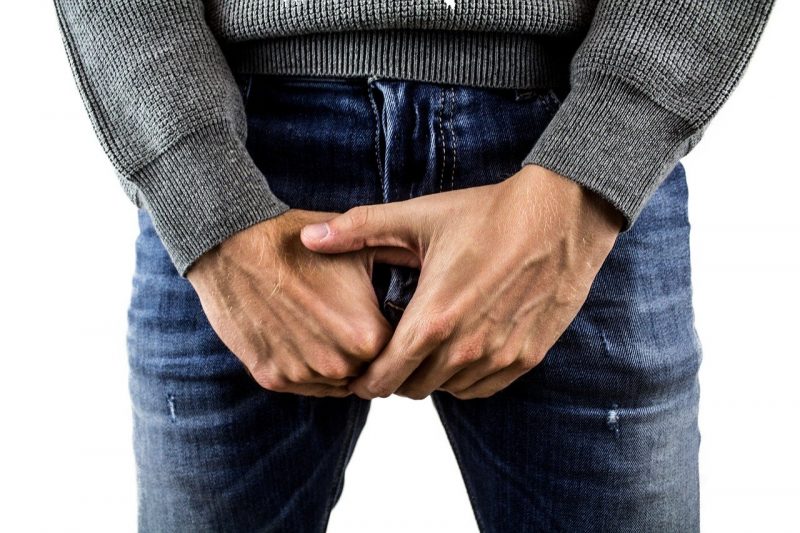Our contributor’s highly personal story of dealing with rape and the justice system
I followed coverage of the Ulster rape trial, which saw rugby players Paddy Jackson and Stuart Olding cleared of raping a 19-year-old girl, with a sickening sense of familiarity. She was scrutinised on every single detail of that night. What was she wearing? Had she been drinking? What was her sexual history? Her bloodstained underwear was passed around the courtroom as evidence.
It was a story that was all too familiar to my own. From the way the defence lawyers preyed on her, to the way her words were manipulated, and her character questioned. They could have been talking about me, and my rape case. This is my story, and this is the unspoken reality of what it’s like to take your rapist to court.
According to Rape Crisis England and Wales, 1 in 4 women and 1 in 18 men have been raped or sexually assaulted. Millions of rapes go unreported, but people are urged not to suffer in silence and to report it to the police when they are raped. We are reassured that justice will be served, that rapists will face consequences for their actions. In reality, less than 1% of rapes reported to the police result in a guilty conviction, something I am all too familiar with. I was raped halfway through my second year at university. Suffering that trauma was awful – but I could never have anticipated the consequences of taking it to court.
The night I was raped I immediately reported it to the police. I was in a state of shock. All I wanted to do was curl up and forget anything had happened, but instead I was driven to the nearest hospital to be prodded, poked and probed for evidence. In the week that followed I had to make written and video statements to the police, going into every little horrible detail about a night I never wanted to remember. Where was I lying? Where was he lying? Did he ejaculate inside me? What type of intercourse was it: vaginal, anal, oral?
But I understood the system – they needed to build a solid case. I worked with them in the hope that justice would eventually come. Everything happened quickly in the first week, then the waiting began. Because of the way the UK legal system works, it can take an excruciatingly long time for a decision to be made. It can be months, even years, for anything to happen.
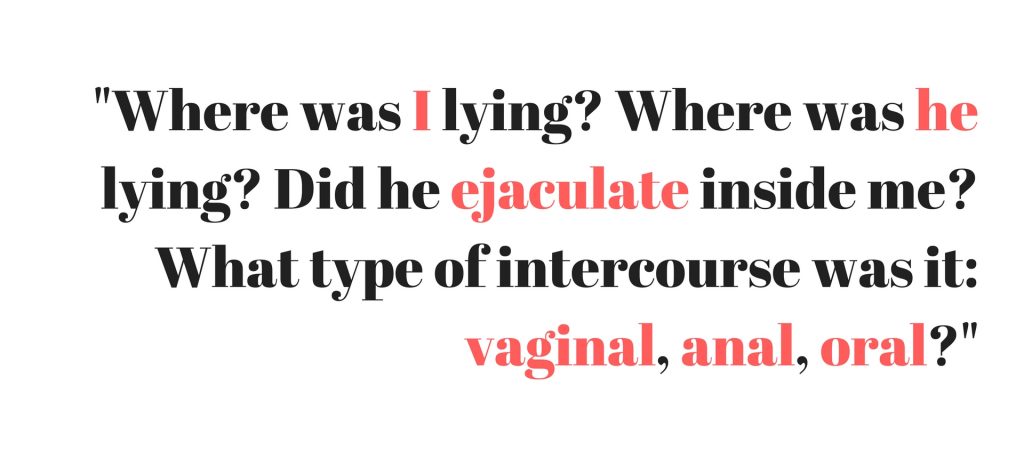
It took four months for the police to send my evidence to the Crown Prosecution Service (CPS), and three months after that for the CPS to decide whether or not to prosecute. After seven months of waiting, a decision was made. They were going to prosecute, and my court date was set for almost a year later. During the months that followed I tried to pretend that everything was normal, but once in a while the pressure would sweep over me. I would lie in bed unable to get out. I suffered from panic attacks and my heart sometimes thudded so hard I thought it would explode, the waiting became unbearable.
After the decision to prosecute was made I was assigned an Independent Sexual Violence Advisor (ISVA) to help me through the court process. I met her as soon as the date of the trial was set, and over the next 10 months we built a solid and trusting relationship. She talked me through my rights, and the set-up of a courtroom. She would attend the pre-trial court visit with me, and sit there on the day for moral support. The dates of my trial got moved forward a month. I was notified, my friends who were going to act as witnesses in the trial were notified, but no one thought to tell my ISVA. It was only during our pre-trial court visit that I mentioned the changed date. She was busy that week.
The system failed to do something as simple as notify her of this change. After a year of building a relationship with someone I had come to trust and depend on, someone who was meant to help me through the most difficult day of my life, she was suddenly taken away from me. I was assigned another ISVA. I had never met her. She didn’t know me or my case. I would meet her for the first time at the trial.
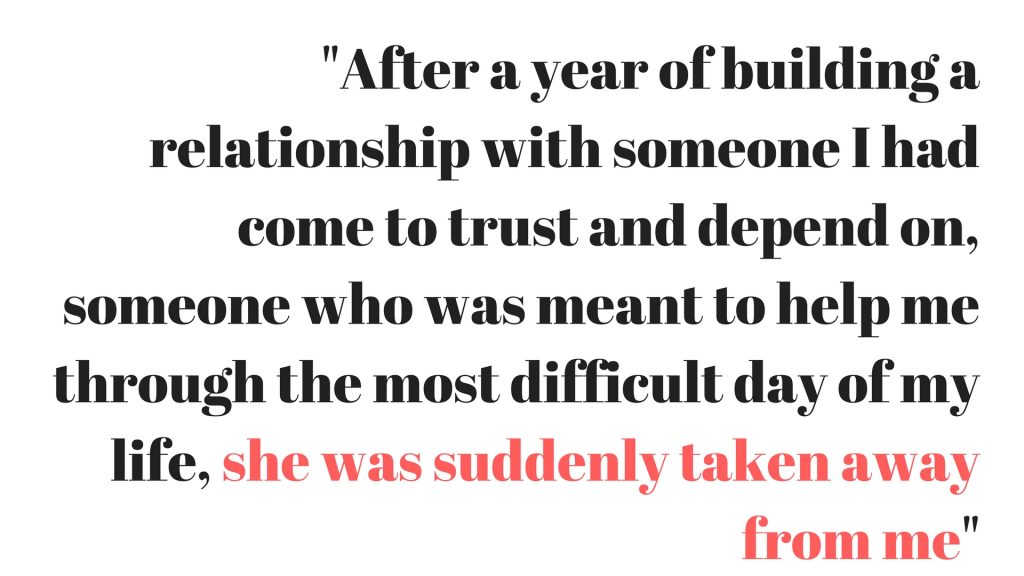
On the day of the trial I arrived at court with with only my boyfriend for support. My friends weren’t able to come as they were all witnesses and I was too nervous to give such explicit evidence in front of my parents. We were taken through the back entrance to a room where we waited to be summoned by the judge. A witness support volunteer arrived – she got my name wrong. It was then I realised that no one had really prepared me for what was about to happen. No one had told me how to answer the questions, or warned me about the ways lawyers can twist your words and trip you up. I had no idea what to expect. I was shaken – and in hindsight, very underprepared.
A month before the trial I had requested that my boyfriend sit in the public gallery. I wanted him in the courtroom with me – even though I was going to sit behind a screen – so I knew someone was in there with me. The usher came in and told me that it was time, the judge had summoned me. As we got ready to go down we were told the assailant’s family were occupying all the bench seats in the public gallery. There would be no space for my boyfriend. He had to sit upstairs alone, with no information and no updates knowing that I would face the lawyers, the jury, and the court, with only myself and the ISVA I had met an hour before.
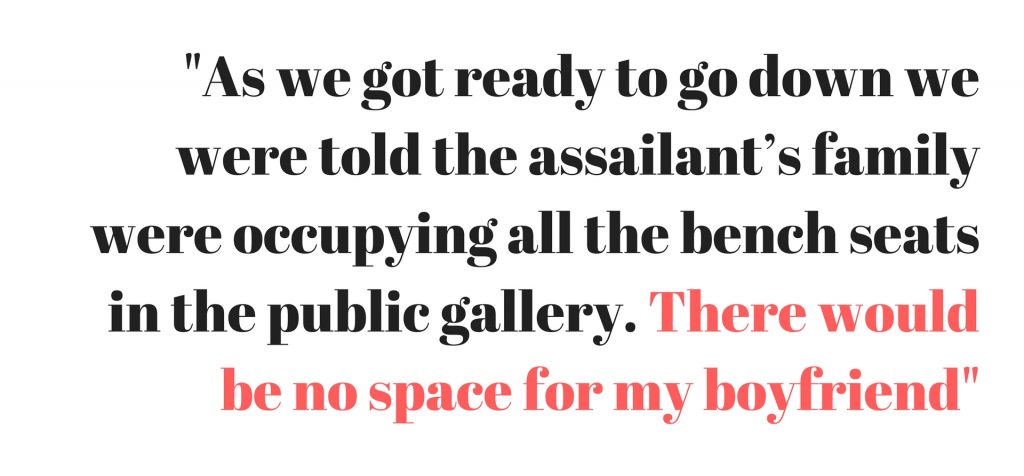
Once I was behind that screen, I could only see the defence lawyer, the jury and the Judge. I had never been more nervous in my life. I was shaking, my heart thudding, I felt as if I was about to throw up. I wondered – why couldn’t the assailant sit behind a curtain, why did I have to be shut off from the entire court? Why were his family allowed to sit in the room, whilst my only real support waited three floors away from me, with no idea of what was happening?
The defence lawyer was a white man, probably in his early 60s. The questioning started – a few basic questions about the crime that had been committed.
The night I was raped I had been out drinking with my friends – this was used against me. He asked: “How much exactly had you been drinking? Could it have been a litre of vodka? You were still drunk at this point. Do you usually drink this amount of alcohol? How often do you drink alcohol? Do you usually drink so excessively?”
In my police statement, the one I had made a year before, I had said I was looking to have a casual one night stand that night. If it happened, great – if not, then no love lost. When it got to this point in my questioning, the defence lawyer spun my words: “You targeted said assailant in the club that night. Your purpose was to take him home. You actively pursued him.”
He took the things that make me who I am – my independence, my sexuality, my love for going out, my passion for being carefree and believing the best in people, and used them to justify my rape in a court of law.
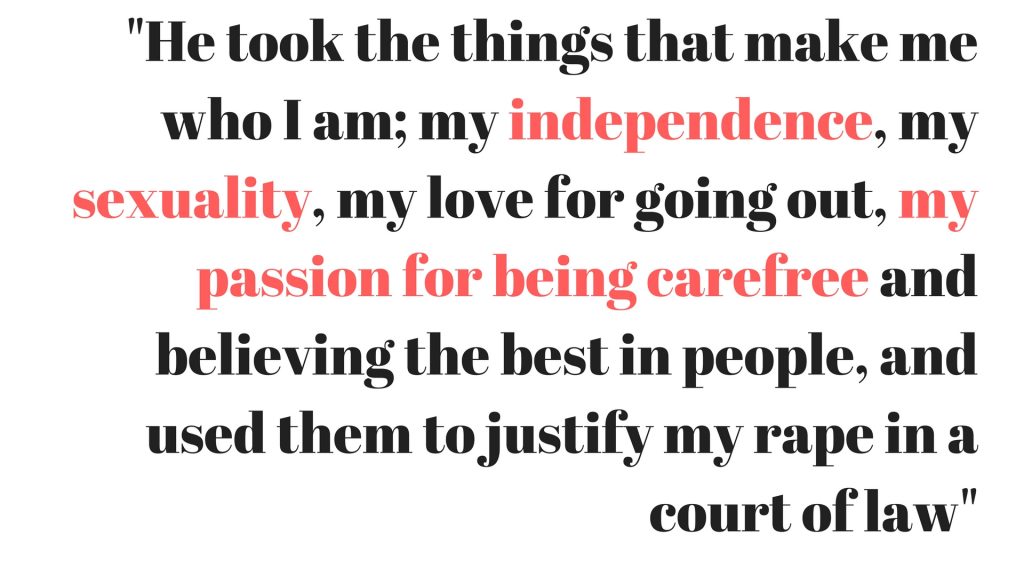
The night I was raped I left in such a rush that I abandoned bits of my clothing at the assailant’s house, including a skirt. “A short skirt”, the defence lawyer specified. He didn’t elaborate, he didn’t have to. The final and worst point of the interrogation was within the conflict of ‘interest’. What actually happened at that crucial point, whether or not it was rape.
“I would like to suggest to you, that you were in fact not raped. That perhaps you were unsatisfied with the performance of X and were displeased with the sexual encounter. When you got up I would like to say to you that you were in fact just a bit huffy with X, not because you had been raped but because you were unhappy.”
I was startled, shocked, disgusted that he used an argument that I was dissatisfied to undermine my rape – but what blindsided me even more was his choice of language. I had to sit and listen to a stranger reduce the most traumatic event of my life to the word ‘huffy.’
Huffy – it means to be annoyed, easily offended, touchy and to quickly take offence at petty things. In my opinion it’s an outdated and sexist insult used by older generations – specifically older men – to patronise younger women. This man, this defence lawyer, had continuously targeted my identity as a means of excusing my rape. I felt vulnerable in that moment, but somehow strengthened by his use of the word huffy. I called him out. I made him define it. I saw him stumble over his words. I looked the jury straight in the eye. Some of them looked back. I’m sure it didn’t change anything, but for the first time in that courtroom I felt empowered.
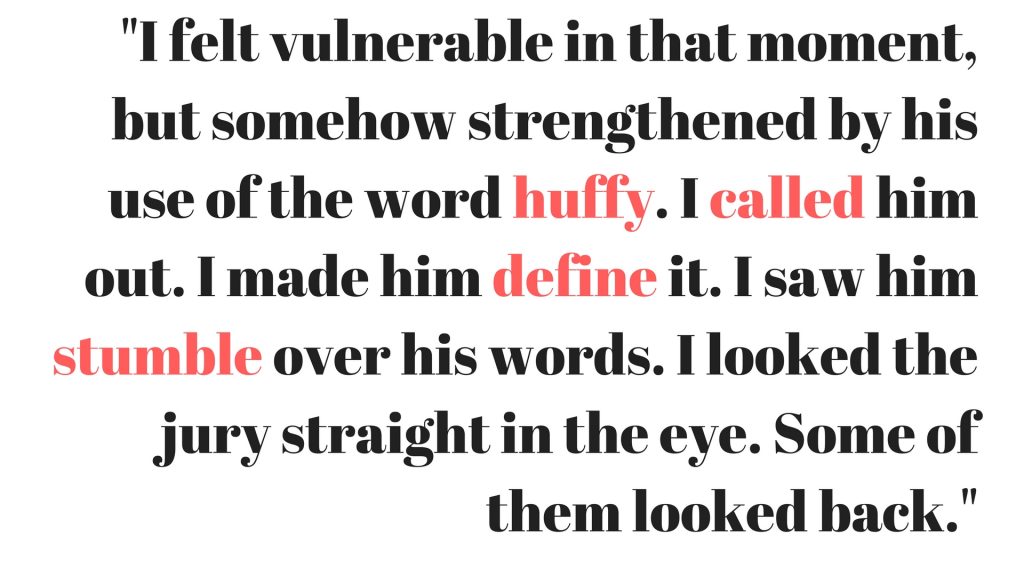
Within an hour and a half the whole thing was over. The police called me up a week later to inform me of the ‘Not Guilty’ verdict. It only took the jury half an hour to come to a decision. I wasn’t surprised, I think I had known from the beginning that reaching a guilty verdict was near impossible. I remember feeling nothing when they told me. Nothing, then relief. I didn’t have to deal with the police, or court, or lawyers anymore. The whole messy, drawn out ordeal was over. It was finally over… or so I thought.
In the months that followed I suffered from PTSD: post-traumatic stress disorder. I had no follow up care and no post-trial counselling. I thought I would feel relieved that I didn’t have to deal with this case anymore, but in truth it felt more like I had been abandoned. I was just another disposable witness in a string of rape cases. If it hadn’t been for my boyfriend, who carried me through the following months, I’m not entirely sure how I would have dealt with it.
What happened to me in that courtroom didn’t hit me for a long time – perhaps I was too naïve before the trial to process it properly. I felt blindsided and humiliated. The accusations I had been subjected to were brutal. After everything I knew about consent, about women’s rights in court, the rules and regulations about rape prosecutions, I thought that I would have had the right to a fair trial and cross examination.
Unfortunately, this was not the case. The defendant was allowed his family in court, and had the right to see all of my evidence months before the trial. He was allowed a character witness, and was offered clear guidance in how to answer during cross-examination. I was given none of this. My rape was torn apart in that courtroom, and the system that claimed to promote justice only made me feel exposed, ashamed and ridiculed.
This is my story. That of the woman in the Ulster case was her story. These stories are hard to hear – but we must listen. How many more people are going to have to tell theirs before we see real change? During her trial, the woman at the heart of the Ulster case said: “Rape is a game of power and control. The only way to take power back is when you actually do something about it.”
Reading her story brought back terrible memories, but with the ongoing protests throughout Ireland, and the news that Olding and Jackson have had their contracts revoked by Ulster Rugby, it finally feels like we are being heard. People are protesting the way rape cases are dealt with in court, advocating for change and demanding for real justice to be served.
Let this be the beginning of a new wave and a new era. A new era that supports and believes survivors of sexual assault, inside and outside the courtroom.
Other support
- Resources and support for victims and survivors of sexual assault
- Gov.uk – Guides for victims of rape and sexual assault: Going to court
- NHS – Help after rape and sexual assault
- Rape Crisis England and Wales – 24/7 Support Line
Read more
Last Reviewed 6 September 2023
Image Credit: Tyler McRobert via Unsplash



